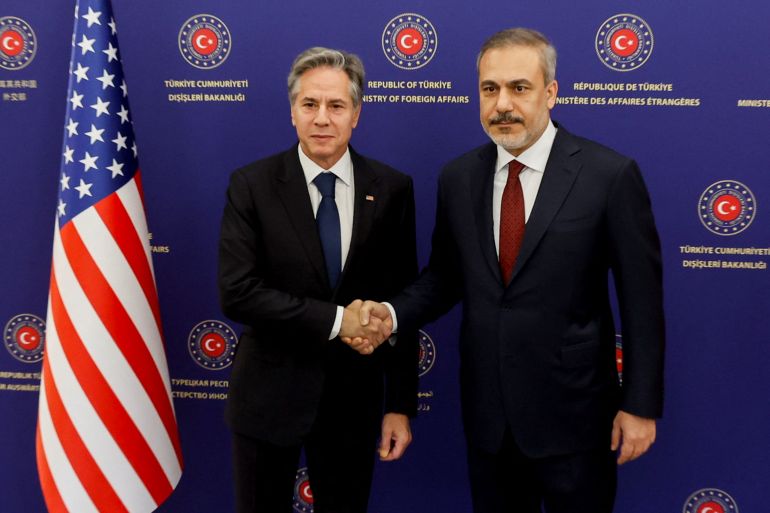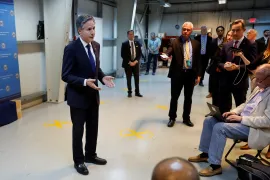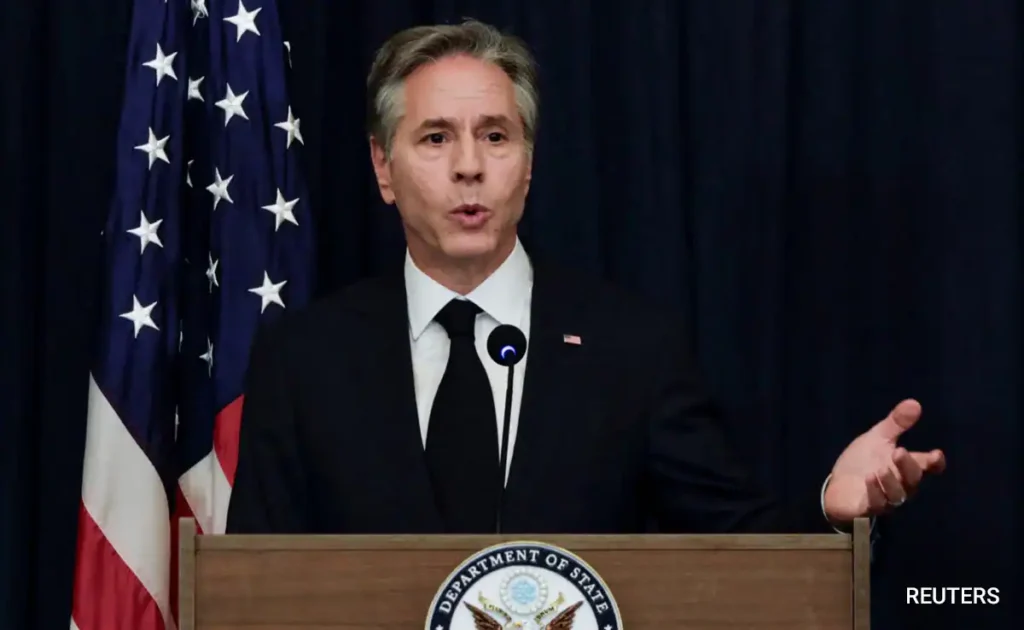Israel-Gaza Talks
United States Secretary of State Antony Blinken met with his Turkish counterpart as part of his challenging Middle East tour aimed at easing regional tensions over the Israel-Hamas war. Blinken and Turkish Foreign Minister Hakan Fidan had a two-and-a-half-hour meeting on Monday morning in Ankara, but President Recep Tayyip Erdogan snubbed him.
Tamer Qarmoot, a professor in public policy at the Doha Institute for Graduate Studies, told Al Jazeera, “Blinken’s main mission was to buy more time [for Israel].” The Turks were aware of this, which contributed to the cold reception.
Blinken’s trip to Turkey followed strained meetings with Arab leaders in Iraq, Palestine, and Jordan over the weekend. Arab and Muslim leaders expressed frustration over Washington’s strong support of Israel during its monthlong assault on Gaza, resulting in nearly 10,000 casualties, including over a third being children.

Washington supported the need for a “humanitarian pause” to the fighting but did not call for a full truce, unlike much of the world. Blinken’s mission, his second to the region since the war began, received limited support. Israel rejected the US push for a pause to the fighting, while Arab and Muslim nations insisted on an immediate ceasefire to reduce casualties in Gaza.
Al Jazeera’s Resul Serdar, reporting from Ankara, suggested that Blinken and Fidan found few points of agreement. The US side attempted to convince Turkish officials to pressure Hamas for the release of captives, but Turkey maintained that the release should be mutual, with both Hamas and Israel releasing prisoners.
Turkey also called for an unconditional ceasefire and proposed an international mechanism to observe the ceasefire, with Ankara as the guarantor. However, Blinken did not mention a ceasefire, emphasizing the term “humanitarian pause,” which the Turkish side considered insufficient.
Despite occasional foreign policy disagreements, Turkey remains a strategic US ally. Since the outbreak of the war, Turkey has been one of the region’s strongest critics of Israel, accusing it of behaving like a “war criminal” and committing a “massacre.”
Public Outrage Mounts Amid Israel-Gaza Diplomacy
Turkey’s frustration towards Washington became evident during Blinken’s visit. In an apparent snub, Erdogan chose to travel across northeastern Turkey, leaving Blinken to meet with his foreign minister.

Hours before Blinken’s arrival, hundreds of demonstrators gathered outside an airbase hosting US troops in southeastern Turkey. Police reportedly dispersed the protests using tear gas and water canisters.
Resul Serdar, reporting from Ankara, stated, “There is huge discontent here. The organizers of the protest are exerting significant pressure on the US and Turkish governments to halt the war in Gaza.”
Foreign Policy Disagreements Highlighted Amid Blinken’s Visit to Turkey
The strained relationship between the US and Turkey predates the Hamas-Gaza war, with the two nations feuding over various foreign policy issues, including NATO and Iraq. The delay in approving a $20 billion deal for 40 F-16 fighter jets by the US Congress has been a source of frustration for Ankara.
Washington is awaiting Turkey’s ratification of Sweden’s bid to join NATO. Additionally, the US has increased sanctions against Turkish entities it accuses of aiding Russia in evading sanctions and importing war-related goods.
Turkey is also angered by the US’s support for Kurdish fighters in Syria, whom Ankara views as part of the banned Kurdistan Workers’ Party (PKK), recognized as such by Turkey, the US, and the European Union.
Mediating Role: Challenges and Diplomacy in US-Turkey Relations
As the Gaza war continues, Erdogan has attempted to position Turkey as a mediator to halt the violence and facilitate the path toward an independent Palestinian state. He stated that Ankara is “working behind the scenes” with regional allies to negotiate a ceasefire and ensure a continuous flow of humanitarian aid into Gaza.
Erdogan emphasized, “Our priority is to promptly establish a humanitarian ceasefire,” and he added that Turkey is developing “new mechanisms that will ensure the security of all, irrespective of their religious background, be they Muslims, Christians, or Jews.”
He also mentioned, “Our efforts to lay the groundwork for an international peace conference are ongoing.”


